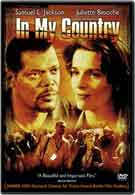In My Countryfollows Anna Malan (Juliette Binoche), a white South African journalist, as she covers the public hearings of the Truth and Reconciliation Commission in 1996. These were conducted throughout South Africa in the late 1990s. Perpetrators of crimes under apartheid had to confess in detail what they had done, and answer their victims’ questions, in exchange for amnesty. Testimony was taken from more than 20,000 victims. The film should have been great because it covers a fascinating piece of recent history that touches on powerful emotions like guilt and forgiveness, but it ends up feeling false and excessively preachy. The TRC hearings were based on the African principle of ubuntu: acknowledgement of guilt, repentence, and asking for and giving forgiveness. Ubuntu is really the star of Country and the natural question it leads to is: should perpetrators of crimes like torture, rape, and mass murder be forgiven, ever? (The filmmakers, to their credit, don’t go for any easy answer to the question.) All of the painful testimonies, including discussions of rape, torture, and murder, are taken from actual Commission tapes. The criminals, who look and act eerily normal, invariably explain that they were just following orders. The film is strongest when it simply presents the victims’ testimonies and criminals’ responses without any unnecessary embellishments.
Anna is Afrikaans, and Afrikaaners were the white minority group that supported apartheid most strongly. Her family and husband, therefore, do not approve of her job or of her support for apartheid’s dissolution. The central conflict is the way Anna confronts what she learns at the hearings. How much collective guilt should she assume for criminal members of her community? Can she still love her family if it turns out that they committed heinous acts? She claims she “didn’t know” about the crimes but when pressed, she finally admits that she suspected something, “we all knew things” but not the hideous, “fucking details.” Guilt and retribution are powerful and inherently dramatic but extra drama is piled on anyway, through Anna’s hand-wringing, and through excessive speechmaking by numerous characters.
Screenwriter, Ann Peabody, was inspired by the book, Country of My Skull, by Antjie Krog, an Afrikaans journalist. Krog really did cover the TRC hearings, and Peabody – a South African now living in Europe – wanted the world to know more about the TRC but the book is mostly a journalistic account of Krog’s observations. Peabody, and director John Boorman, realized that abstract moral questions and a journalist’s factual reporting couldn’t sustain a full, feature length film so they had to craft a story around their fictionalized Anna. It was necessary but their overcooked plot sticks too many busy complications onto Anna’s life. They should have studied the understated dialogue and restrained acting in Hotel Rwanda as a successful model of how to mix historical truth with fictionalized details.
As presented, Anna’s extenuating circumstances include her family obligations, her relatives’ former complicity with the apartheid regime, and (ah, yes) her relationships with her colleagues. She travels around the nation to the hearings with her sound engineer, Dumi Mkhalipi (Menzi Nugbane). This is Nugbane’s first film but he’s a well-known TV actor in South Africa and he’s already got the alert, penetrating gaze that all great stars have. He and Anna quickly join forces with Langston Whitfield (Samuel Jackson) an African American reporter from the Washington Post. Whitefield is hot on the trail of a sociopathic Afrikaans militia leader (Brendon Gleeson), and he conducts a leisurely, chilling interview with the calculating madman that could have been great if some of the glowering stares, and all of the cadaverous lighting, were removed. At first Winfield doesn’t believe in forgiveness, or that an Afrikaaner like Anna can truly be considered “African” but he is convinced otherwise, of course, and also discovers that he has much to learn about the African ways of ubuntu.
The film implies that ubuntu was readily embraced by virtually all South Africans, although news reports coming out of the country suggest otherwise, but a film can’t be expected to explore all the complexities of the culture. Whitfield’s two-dimensional anger, and his hokey love affair with Anna, are more disappointing. Maybe I’m just too jaded but it seems unlikely that these two people would come together, separated as they are by culture, race, and language, not to mention that she’s married, with young children whom she presumably loves. Whitfield keeps talking about race as a great dividing line that can’t be breached yet we are to believe that he changes his lifelong philosophy and falls in love with this white woman just because she feels really bad about the crimes of apartheid. If two, such mismatched people did have an affair they would probably regret it pretty quickly, and end up in one of those awkward, morning-after situations, but Anna and Whitfield develop a full-blown relationship; she even brings him home to meet her sympathetic mother.
But the major problem underlying all the false relationships and heightened drama is that the audience isn’t allowed make inferences on their own. There are too many awkward monologues where moral dilemmas are spelled out, word by obvious word. For instance, I thought that the most effecting line was when Anna says, quietly “I feel so ashamed” regarding her countrymen. That single sentence and the catch in her voice tell us everything we need to know about her emotional turmoil, but, unfortunately, Boorman and Peabody don’t know how to stop when they’re ahead. She keeps on talking: about how she and criminals share the same native language, and how they have used that language -- the language in which Anna writes about love! – to give orders for death and torture. It’s too much. I appreciate Country’s serious intentions and I really wanted to love it but I just didn’t. It drowns in excess, despite a few great scenes. In My Country is a beautifully lit film which really shows up well on DVD. Most daytime scenes are bathed in golden light that translated nicely to disc. Unfortunately, the sound seems muffled and dialogue is sometimes mumbly and difficult to understand. The disc's Special Features include deleted scenes, director commentary, and interviews.
The deleted scenes provide more background and explanations about Langston Whitfield, the Samuel Jackson character. In one, he’s shown to be a neglectful, absentee to his young son, and in another he’s just arrived home from South Africa and sermonizes his newly delighted son about African wisdom he has learned. Thank God these were left out of the final cut; they would have increased the preachy factor of the film. If only director Boorman had had the sense to leave out other moralizing sequences!
Your Daily Blend of Entertainment News
The interviews include Binoche, Boorman, Peabody, plus the three producers. Oddly, Jackson, the most famous actor in the film, isn’t included and his absence isn’t explained. Binoche gives a typical, gushy interview about how marvelous it was to work with everyone, especially Boorman. The producers talk more or less convincingly about how they believed in the project but the most impressive speakers are Boorman and Peabody, because they give some insights into what went wrong with this promising film.
Boorman is a veteran director – his career began back in the 1970’s with Deliverance (“Squeal like a pig”) – and he talks movingly about how he has wanted to tell a story about South Africa and apartheid for many years, and about his emotional investment in this film. Peabody tells a similar story. She’s an expatriate South African who left during apartheid because the politics of her country were unbearable. She, even more than Boorman, longed to tell a story about apartheid and was very excited when she discovered Krog’s book on which the film is loosely based. The interviews left me feeling disappointed that these earnest people got carried away by their emotions during filming and eliminated all subtlety from the final product instead of leaving more to the power of performance and the audience themselves.

